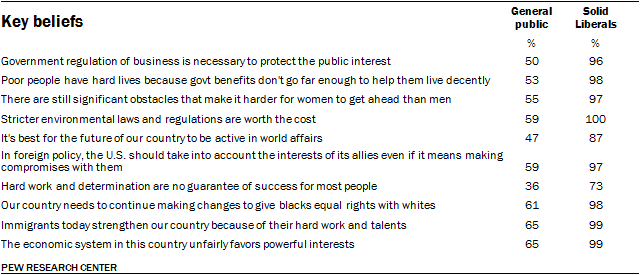
Defining values: This overwhelmingly Republican group holds conservative attitudes across a wide range of issues, especially in their support for smaller government. Core Conservatives are deeply skeptical of the social safety net and favor lower tax rates on corporations and high-income individuals. While they are divided on whether immigrants do more to strengthen or burden the country, Core Conservatives offer far more positive views of immigrants than do Country First Conservatives. Core Conservatives are relatively upbeat about national conditions and a majority says that the United States “stands above” all other nations in the world.
Political attitudes: Core Conservatives are highly engaged in politics: Fully 93% say they always or nearly always vote in elections. While they overwhelmingly approve of Donald Trump’s job performance, about half say they have “mixed feelings” about Trump’s personal conduct in office.
Who they are: Two-thirds (67%) are men, a far greater share than for any other typology group. More than eight-in-ten (85%) are non-Hispanic white. Core Conservatives are among the most content with their personal financial situation of the groups. They are more likely than other GOP-leaning groups to have completed college (33% have at least a bachelor’s degree), but they also are the group most likely to say colleges and universities have a negative effect on the country (80%).
Lifestyle notes: Core Conservatives are more likely than other typology groups to own their homes, and many have money invested in the stock market. Roughly half (53%) say their family has achieved the American Dream, the most of any typology group.
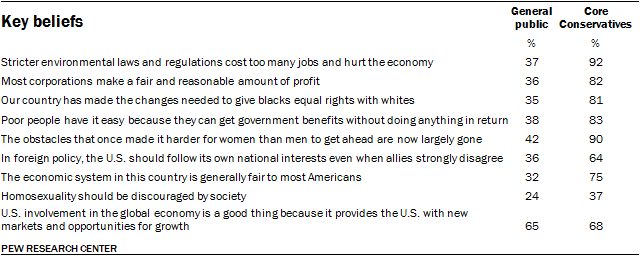

Defining values: This largely Republican group is highly critical of immigration and U.S. global involvement. Country First Conservatives are most likely to describe immigrants as a burden on the country and to say that too much openness threatens American identity. More than any other group, they say that America should act in its own interest even when its foreign allies disagree. Like Core Conservatives, they prefer a smaller government with fewer services, and most think that government is wasteful and inefficient. Country First Conservatives are conservative on social issues and are the only typology group in which a majority says homosexuality should be discouraged by society.
Political attitudes: Country First Conservatives are staunch supporters of Donald Trump – 93% have a favorable opinion of the president. They tend to closely follow politics and government, but they are not as politically engaged as Core Conservatives.
Who they are: Country First Conservatives are the oldest typology group (71% are 50 or older) and among the most likely to say they attend church at least weekly (50%). Most are white non-Hispanic (83%), and 54% are men. Half (50%) have a high school degree or less education.
Lifestyle notes: Country First Conservatives would overwhelmingly rather live in a community where houses are larger and farther apart than smaller and closer together, and they are more likely than those in other groups to live in rural areas. Half are retired, by far the highest share among all typology groups. More than four-in-ten (45%) say they enjoy hunting and sport shooting a lot.
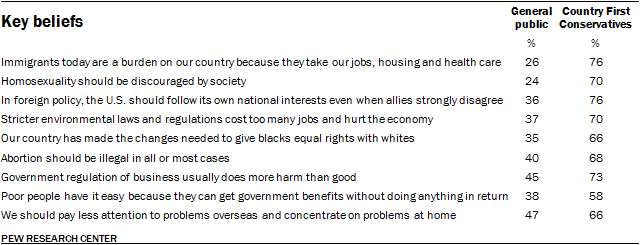

Defining values: Critical of many major institutions and government, Market Skeptic Republicans mostly identify with, or lean toward, the GOP. They stand out from other Republican-oriented groups in their negative views of the economic system: An overwhelming majority say it “unfairly favors powerful interests.” Most also say businesses make too much profit, and they are the most likely Republican-leaning group to want to raise taxes on corporations (55%). They are similar to other GOP-leaning groups in their skepticism about the social safety net.
Political attitudes: Market Skeptic Republicans are less politically engaged than the two conservative groups; only 44% say it matters a great deal which party controls Congress next year. They also are downbeat about politics: 54% say their side has been losing more often than winning on the issues that matter to them. While they hold the Democratic Party in low regard, a third of Market Skeptic Republicans also have an unfavorable view of the GOP.
Who they are: A majority (55%) of Market Skeptic Republicans are younger than 50. Only about a third (34%) say they attend religious services at least weekly, the lowest share among Republican-leaning groups. Most have family incomes below $75,000 annually, and 46% are not satisfied with their financial situation.
Lifestyle notes: A relatively large share of Market Skeptic Republicans (50%) say they have lived in or near their local community for their entire life. Most (57%) say a friend or family member has been addicted to drugs, a larger share than most other typology groups. They also are among the most likely to be regular smokers.
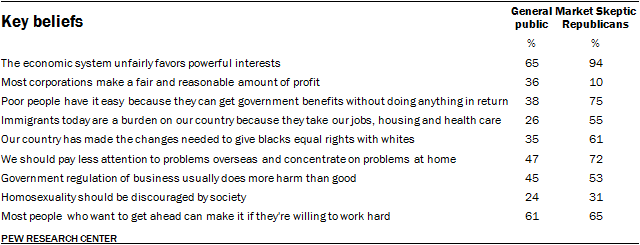

Defining values: This relatively young, economically conservative, Republican-leaning group tends to be relatively moderate on immigration and views about America’s engagement with the rest of the world. Most say U.S. involvement in the global economy is a good thing and that immigrants strengthen the nation. As is the case with other GOP-leaning groups, a majority of New Era Enterprisers reject the idea that racial discrimination is the main reason many black people are unable to get ahead. Nearly two-thirds favor societal acceptance of homosexuality. New Era Enterprisers are less critical about government than other Republican-leaning groups.
Political attitudes: About six-in-ten (63%) New Era Enterprisers approve of Donald Trump’s job performance. But more take a negative (39%) than positive view (23%) of Trump’s conduct in office; 38% have mixed feelings. Of all the Republican-leaning typology groups, they are least likely to express negative attitudes toward the Democratic Party. Like Market Skeptic Republicans, New Era Enterprisers are less politically engaged than the two conservative GOP-oriented groups.
Who they are: New Era Enterprisers are the youngest Republican-oriented group: 26% are younger than 30, and a majority are under the age of 50. While two-thirds (66%) are non-Hispanic whites, New Era Enterprisers have the highest share of non-whites among Republican-leaning groups. While they are not affluent, a large majority (72%) say they are generally satisfied with their financial situation.
Lifestyle notes: Reflecting their relative youth, 60% of New Era Enterprisers enjoy exercising and they are among the least likely to regularly smoke cigarettes. New Era Enterprisers are more likely than those in other Republican-leaning groups to live in urban areas.
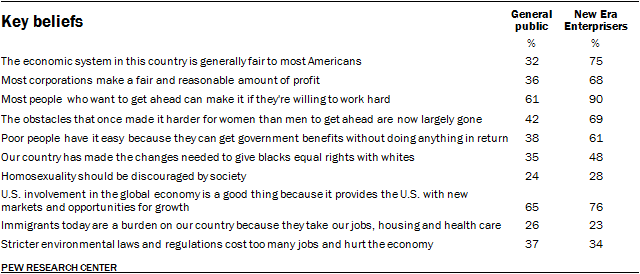

Defining values: This racially and ethnically diverse group is less politically homogenous than most other typology groups, though a 59% majority associates with the Democratic Party. Devout and Diverse voice strong support for the social safety net and further action on racial equality. However, they take more conservative views than their fellow Democratic-leaning groups on a number of issues including global engagement, views of business and attitudes on homosexuality and immigrants. Devout and Diverse are defined, in part, by their faith: Most say that it is necessary to believe in God in order to be moral and have good values.
Political attitudes: Most disapprove of Donald Trump’s job performance, but their opposition to Trump and the GOP is not especially intense. In part, this reflects the fact that about a quarter (26%) are Republicans or lean toward the Republican Party, and 40% describe their own ideology as conservative. Devout and Diverse are not deeply engaged in politics. Only 43% say they follow what’s going on in politics and government most of the time (the lowest of any typology group), and just 44% say it matters a great deal which party wins control of Congress next year.
Who they are: Devout and Diverse are majority non-white: Three-in-ten are black, 16% are Hispanic, 7% are some other race (including Asian or Native American) or of mixed race. Just 15% have a college degree, and only about a third are satisfied with their own financial situation. Devout and Diverse are the oldest Democratic-oriented typology group: 60% are 50 and older.
Lifestyle notes: About four-in-ten (41%) say they attend religious services at least once a week, the highest share across Democratic-leaning groups. Just 35% say they have any investments in the stock market. They are among the most likely to regularly smoke cigarettes.
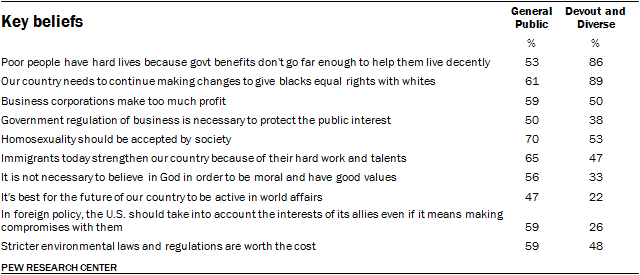

Defining values: This majority-minority group mostly identifies as Democratic or leans toward the Democratic Party. Disaffected Democrats strongly believe the economic system unfairly favors powerful interests and that business corporations make too much profit. Relatively few believe their family has achieved the American Dream, and 24% believe it is out of reach for their family. Most say the government should do more to help the needy and that poor people have hard lives because government benefits do not go far enough to help them live decently. In contrast to other Democratic-oriented groups, a majority (63%) characterizes government as “almost always wasteful and inefficient.”
Political attitudes: Though less politically engaged, Disaffected Democrats share Solid Liberals’ disapproval of Donald Trump: 91% disapprove of his job performance, including 85% who do so strongly. Just 43% of Disaffected Democrats say voting gives people like them some say about how the government runs things, the lowest percentage of any typology group.
Who they are: Over half (56%) of Disaffected Democrats are non-white. Highly financially stressed, they are the least likely to own a home and – along with Devout and Diverse – would have a tougher time than other typology groups if they needed to live off of their savings.
Lifestyle notes: Most Disaffected Democrats (55%) say they have lived in or near their local community for their entire life. Most (58%) say they enjoy volunteering “a lot.”
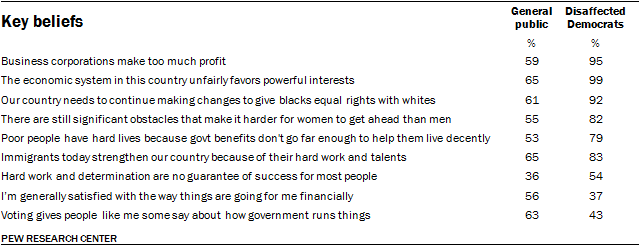

Defining values: Democratic-leaning and financially comfortable, Opportunity Democrats have liberal attitudes on most issues including the environment, immigration and homosexuality. They stand out from other Democratic groups in their strong belief that hard work is enough for most people to get ahead and for being somewhat less likely to see structural barriers facing blacks and women. They are supportive of U.S. engagement abroad and involvement in global markets.
Political attitudes: Opportunity Democrats are among the most likely to describe their own political views as moderate: 46% say this, compared with 32% who say they are liberal and 21% who identify as conservative. While a wide majority disapprove of Trump’s job performance (86%), Opportunity Democrats are less likely to strongly disapprove of Trump than either Solid Liberals or Disaffected Democrats.
Who they are: About six-in-ten (57%) are non-Hispanic whites, 14% are black and 20% are Hispanic. About a third (34%) are college graduates, another 30% have some college experience. They are among the more financially satisfied typology groups: 66% say they are satisfied with the way things are going for them financially.
Lifestyle notes: About eight-in-ten (79%) are satisfied with the way things are going in their local communities. They are more likely than other groups to have friends who do not share their partisan affiliation. Most have a current U.S. passport and say they have money invested in the stock market.
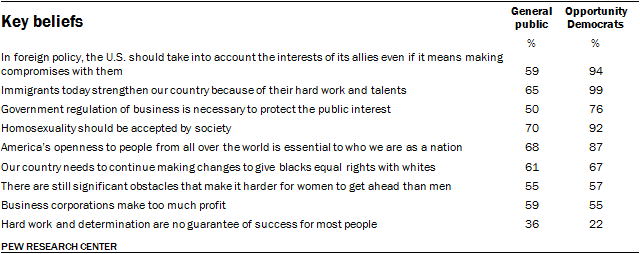

Defining values: Highly educated and politically engaged, Solid Liberals hold consistently liberal values. They back a robust role for government and are strong advocates of the social safety net. Large majorities view the current economic system as unfair and see economic inequality as a major problem. They take broadly positive views of immigrants, and fully 99% think being open to people from around the world is an essential part of the nation’s identity. Most say more needs to be done to address both racial discrimination and obstacles to women’s achievement. They support same-sex marriage and believe homosexuality should be accepted by society. Solid Liberals are the most Democratic of all typology groups: nearly two-thirds (64%) identify as Democrats, another 35% lean toward the Democratic Party.
Political attitudes: Solid Liberals are the most engaged Democratic group – 89% say they vote always or nearly always, and fully 97% say it matters a great deal or fair amount which party wins control of Congress next year. Their opposition to Donald Trump is overwhelming: 97% say they strongly disapprove of his job performance, and 91% say they disagree with Trump on all or nearly all issues. A 71% majority identify as liberal.
Who they are: The most highly educated of the typology groups, 57% are college graduates and nearly three-in-ten (29%) have a graduate degree. Non-Hispanic whites make up the vast majority of this group (73%), and the group is more female than male (59% to 41%). Solid Liberals are financially satisfied and among the most likely to live in urban areas.
Lifestyle notes: Most Solid Liberals (72%) say they enjoy going to museums a lot, and 75% say artists contribute a lot to society – the highest shares across typology groups. They are less likely than other groups to have a religious affiliation, and just 15% say they attend religious services weekly or more, by far the lowest share of any typology group.
